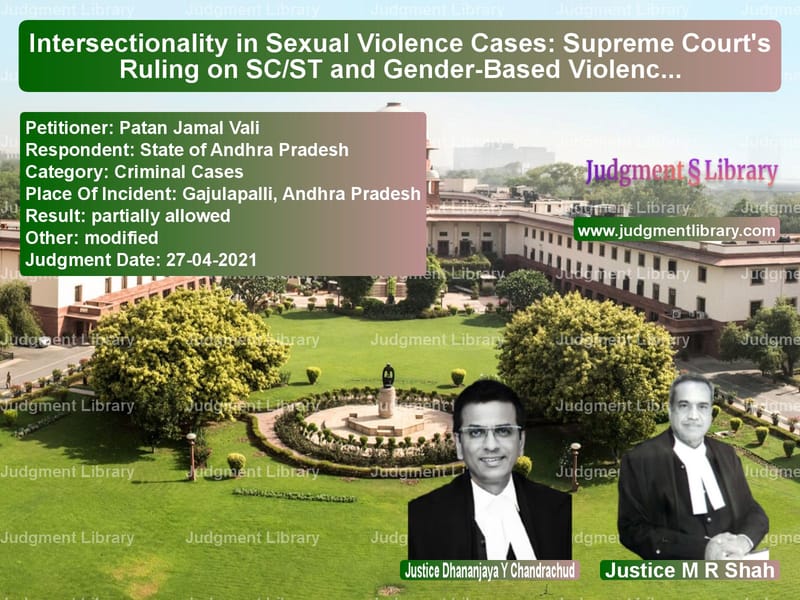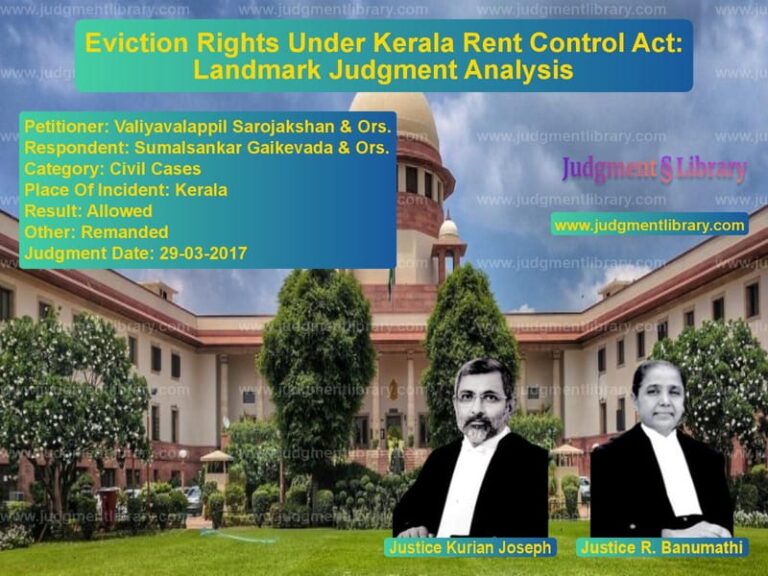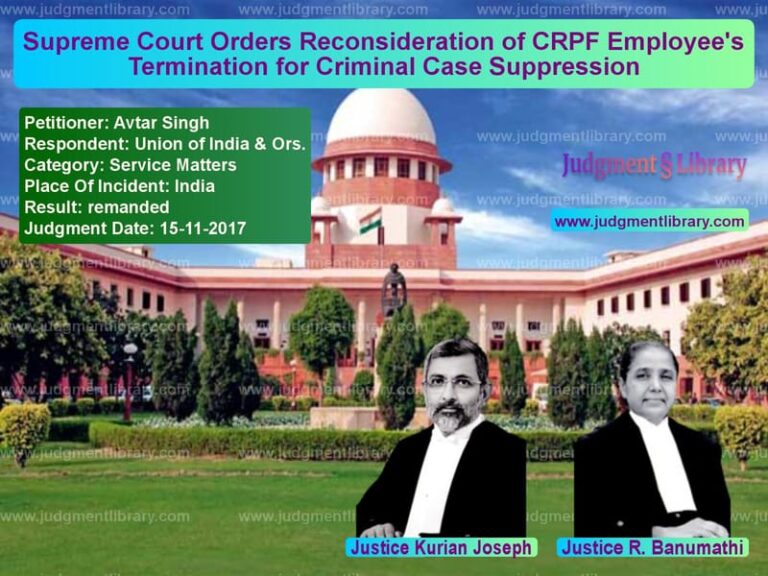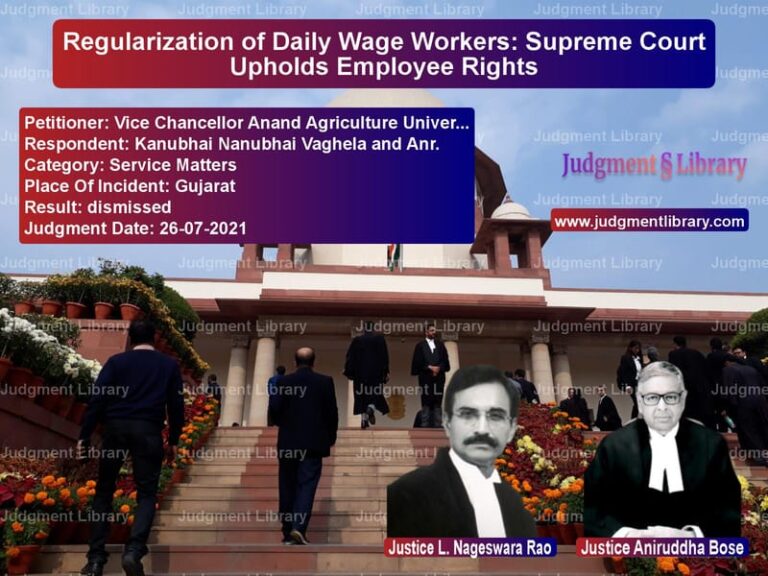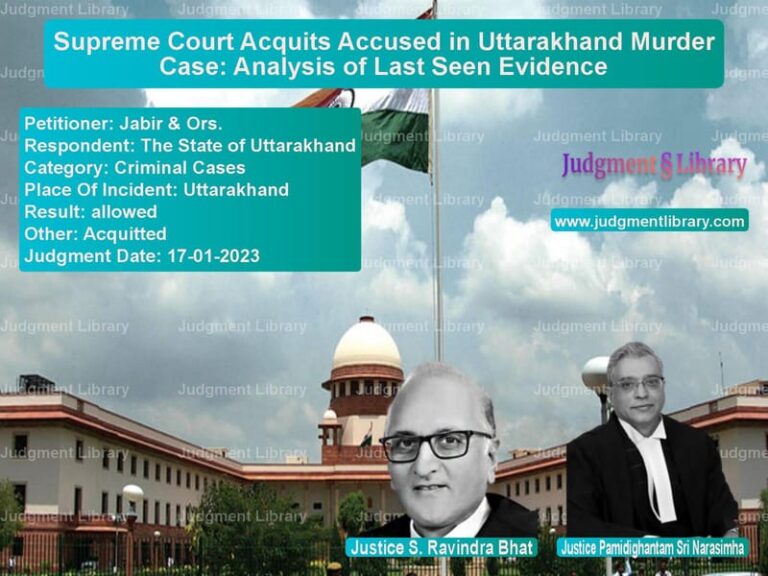Intersectionality in Sexual Violence Cases: Supreme Court’s Ruling on SC/ST and Gender-Based Violence
The Supreme Court of India, in the case of Patan Jamal Vali v. The State of Andhra Pradesh, addressed significant legal questions surrounding sexual violence, intersectionality, and the protection of marginalized communities under the Scheduled Castes and Scheduled Tribes (Prevention of Atrocities) Act, 1989 (SC & ST Act). The judgment examined how caste, gender, and disability interact in cases of sexual violence, particularly when the victim belongs to a Scheduled Caste and has a disability.
Background of the Case
The appellant, Patan Jamal Vali, was convicted under Section 376(1) of the Indian Penal Code (IPC) and Section 3(2)(v) of the SC & ST Act. The case stemmed from an incident that occurred on March 31, 2011, in Gajulapalli village, Andhra Pradesh. The victim, a blind woman from birth (PW2), lived with her mother (PW1) and brother (PW3). The appellant was known to the family and had been working as a manual laborer in the village for two years.
According to the prosecution, the appellant entered the victim’s house under the pretense of inquiring about her brothers’ whereabouts. Finding her alone, he forcibly raped her, leaving her injured and bleeding. Her mother and brother, alerted by her cries, found the door locked from inside. Upon breaking in, they caught the appellant attempting to escape and found the victim in a nude and injured condition.
Key Issues Raised
- Did the prosecution establish the crime under Section 3(2)(v) of the SC & ST Act?
- Did the appellant target the victim because of her caste identity?
- Was the punishment of life imprisonment appropriate under Section 376(1) of the IPC?
Arguments by the Petitioner (Patan Jamal Vali)
- “There is no evidence to prove that the crime was committed on the ground that the victim belonged to a Scheduled Caste.”
- “The prosecution failed to establish a caste-based motive, which is essential under Section 3(2)(v) of the SC & ST Act.”
- “The sentence of life imprisonment is excessive and should be reconsidered.”
Arguments by the Respondent (State of Andhra Pradesh)
- “The victim’s disability and caste identity made her a vulnerable target, and the crime was committed with full knowledge of her background.”
- “The appellant’s knowledge of the victim’s caste and disability should be sufficient to attract the enhanced punishment under the SC & ST Act.”
- “Life imprisonment is justified given the heinous nature of the crime and the exploitation of the victim’s vulnerability.”
Supreme Court’s Observations on Intersectionality
The Court extensively discussed the concept of intersectionality, recognizing that individuals may suffer discrimination and violence due to multiple overlapping identities. It acknowledged that:
- “Violence against women from marginalized communities cannot be viewed in isolation from their caste, gender, and disability.”
- “The experience of sexual assault is different for a woman belonging to a Scheduled Caste community and having a disability due to the compounding effects of discrimination.”
- “Caste-based sexual violence must be understood in the larger context of historical and systemic oppression.”
Judgment on Section 3(2)(v) of the SC & ST Act
The Supreme Court noted that, at the time of the offense, Section 3(2)(v) of the SC & ST Act required the prosecution to prove that the crime was committed “on the ground” of the victim’s caste. The Court found that the prosecution failed to present specific evidence that the appellant targeted the victim solely because of her Scheduled Caste identity. As a result, the conviction under this provision was set aside.
Read also: https://judgmentlibrary.com/mukhtar-ansaris-custody-supreme-court-orders-transfer-to-uttar-pradesh/
However, the Court clarified that the 2016 amendment to the SC & ST Act had changed the requirement from “on the ground” to “knowing that such person is a member of a Scheduled Caste”. If the offense had occurred post-2016, the outcome might have been different.
Sentencing Under Section 376(1) of the IPC
Despite setting aside the SC & ST Act conviction, the Supreme Court upheld the life imprisonment sentence under Section 376(1) of the IPC. The Court emphasized:
- “The victim was a blind woman, making her particularly vulnerable to exploitation.”
- “The crime was committed in her own home, violating her sense of safety and security.”
- “The appellant’s position as an acquaintance of the victim’s family facilitated his ability to commit the crime, demonstrating a breach of trust.”
Implications of the Judgment
This ruling underscores critical legal principles regarding sexual violence, caste discrimination, and gender-based violence:
- Courts must adopt an intersectional approach when dealing with crimes against marginalized women.
- The burden of proving caste-based motivation under the SC & ST Act (pre-2016) was too high, leading to acquittals in cases where caste-based discrimination was implicit but not explicitly proven.
- The 2016 amendment, which requires only knowledge of caste identity rather than direct causation, strengthens protections for SC & ST individuals.
- Judicial and law enforcement training should ensure a nuanced understanding of cases involving disabled victims from marginalized communities.
Conclusion
The Supreme Court’s ruling in Patan Jamal Vali v. State of Andhra Pradesh is a landmark case for understanding sexual violence through the lens of intersectionality. By recognizing the unique vulnerabilities faced by disabled and marginalized women, the Court reinforced the importance of a contextual and empathetic approach in adjudicating such cases. While the conviction under the SC & ST Act was overturned due to the evidentiary standard at the time, the life sentence under IPC Section 376(1) was affirmed, ensuring justice for the victim.
Petitioner Name: Patan Jamal Vali.Respondent Name: State of Andhra Pradesh.Judgment By: Justice Dhananjaya Y Chandrachud, Justice M R Shah.Place Of Incident: Gajulapalli, Andhra Pradesh.Judgment Date: 27-04-2021.
Don’t miss out on the full details! Download the complete judgment in PDF format below and gain valuable insights instantly!
Download Judgment: patan-jamal-vali-vs-state-of-andhra-prad-supreme-court-of-india-judgment-dated-27-04-2021.pdf
Directly Download Judgment: Directly download this Judgment
See all petitions in SC/ST Act Case
See all petitions in Rape Cases
See all petitions in Judgment by Dhananjaya Y Chandrachud
See all petitions in Judgment by Mukeshkumar Rasikbhai Shah
See all petitions in partially allowed
See all petitions in Modified
See all petitions in supreme court of India judgments April 2021
See all petitions in 2021 judgments
See all posts in Criminal Cases Category
See all allowed petitions in Criminal Cases Category
See all Dismissed petitions in Criminal Cases Category
See all partially allowed petitions in Criminal Cases Category

